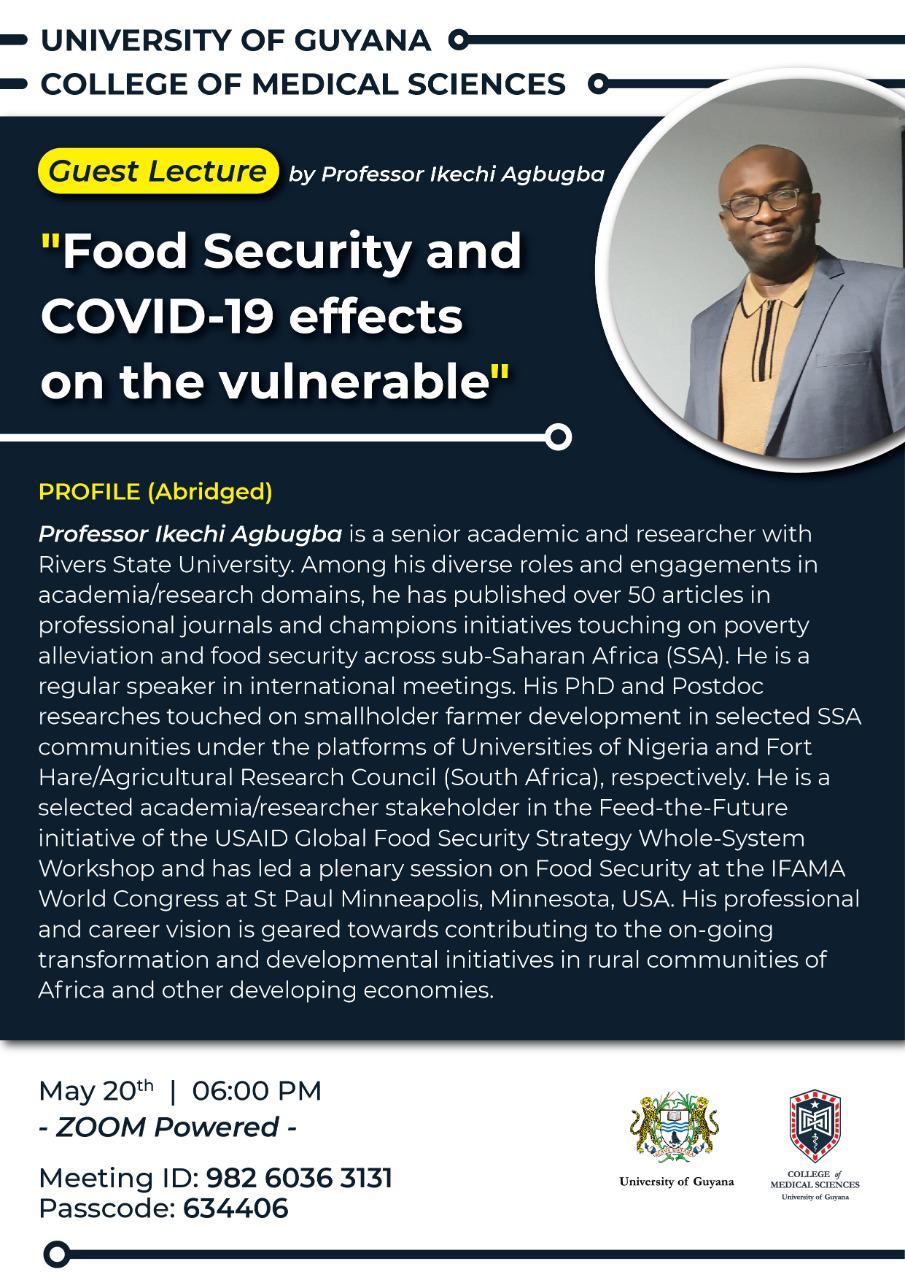At the beginning of 2020, 135 million persons faced acute food insecurity,” starts Dr Ikechi Agbugba, in his guest lecture series for the College of Medical Sciences, University of Guyana. In his lecture, Dr Agbugba talks about food security, the vulnerable population and how COVID-19 affects the vulnerable in Africa.
Food security is not just a term, it is also a concept. It is a situation in which all people, at all times have physical, social and economic access to sufficient, safe and nutritious food to meet their dietary needs and food preferences for an active and healthy life.
“When we look at the concept of food security, we need to consider the four dimensions of food security", says Dr Agbugba. These four dimensions are availability, accessibility, utilization and stability. He adds that it is important to look at the dimensional approaches in ensuring food security. Herein, the concept ensures that all people across the world have access to sufficient food to meet their dietary needs is important. Besides, it is important everyone is empowered to make her or his own choices about what to eat, where it comes from and where it is produced. Moreover, healthy and nutritious food should be assured.
Dr Agbugba continues his lecture about the vulnerable, that the four main types of vulnerability and affected populations are already noted. The affected population are a group of persons that are directly impacted by conflict or disaster. COVID-19 pandemic can be seen as an event, affecting many vulnerable persons in terms of food insecurity. “In some cases, corrupt practices in Africa cause persons in vulnerable positions were not receiving food or assistance during the lockdown last year”, Dr Agbugba retorted. Research experts in global agriculture sector confirm that the fast-spreading COVID-19 pandemic across the continent have a negative impact on food security.
Dr Agbugba explains why it is important to trade foods within Africa, instead of importing it from outside of Africa. “If we import food from outside of Africa, we will spend more money”. Women and youth are the ones that will drive transformation and therefore every agricultural intervention must recognize them. The perception of our farmers should be changed. “Our youth have the perception problem that farming is for the poor, that farming the vulnerable, but that is wrong”, Agbugba says.
He concludes his lecture by saying: “Africa has so much facilities with respect to agriculture. So why should Africa have to struggle with food insecurity in this pandemic?” A question important to keep in mind for future development. Watch the full lecture above.
“When we look at the concept of food security, we need to consider the four dimensions of food security", says Dr Agbugba. These four dimensions are availability, accessibility, utilization and stability. He adds that it is important to look at the dimensional approaches in ensuring food security. Herein, the concept ensures that all people across the world have access to sufficient food to meet their dietary needs is important. Besides, it is important everyone is empowered to make her or his own choices about what to eat, where it comes from and where it is produced. Moreover, healthy and nutritious food should be assured.
Dr Agbugba continues his lecture about the vulnerable, that the four main types of vulnerability and affected populations are already noted. The affected population are a group of persons that are directly impacted by conflict or disaster. COVID-19 pandemic can be seen as an event, affecting many vulnerable persons in terms of food insecurity. “In some cases, corrupt practices in Africa cause persons in vulnerable positions were not receiving food or assistance during the lockdown last year”, Dr Agbugba retorted. Research experts in global agriculture sector confirm that the fast-spreading COVID-19 pandemic across the continent have a negative impact on food security.
Africa has vast resources with respect to agriculture. That Africa has to struggle with food insecurity in the pandemic is an aberrationFood insecurity is strongly present in Sub Saharan Africa. Dr Agbugba shows a diagram and explain that food security is not only dependent on planting and harvesting, but that other factors, including social and economic factors, are important as well. Food prices are a very big issue at the moment. Because of COVID-19, there is a lot of disruption in the food supply chain in African countries. This is likely to result in millions of people facing food shortages during and after COVID-19. Lockdowns, for example, are a big threat to food security, since farmers cannot go to their farmlands to work. However, this can be avoided by allowing farmers to be recognized as essential service providers.
Dr Agbugba explains why it is important to trade foods within Africa, instead of importing it from outside of Africa. “If we import food from outside of Africa, we will spend more money”. Women and youth are the ones that will drive transformation and therefore every agricultural intervention must recognize them. The perception of our farmers should be changed. “Our youth have the perception problem that farming is for the poor, that farming the vulnerable, but that is wrong”, Agbugba says.
He concludes his lecture by saying: “Africa has so much facilities with respect to agriculture. So why should Africa have to struggle with food insecurity in this pandemic?” A question important to keep in mind for future development. Watch the full lecture above.
About Dr Ikechi Agbugba

Related


